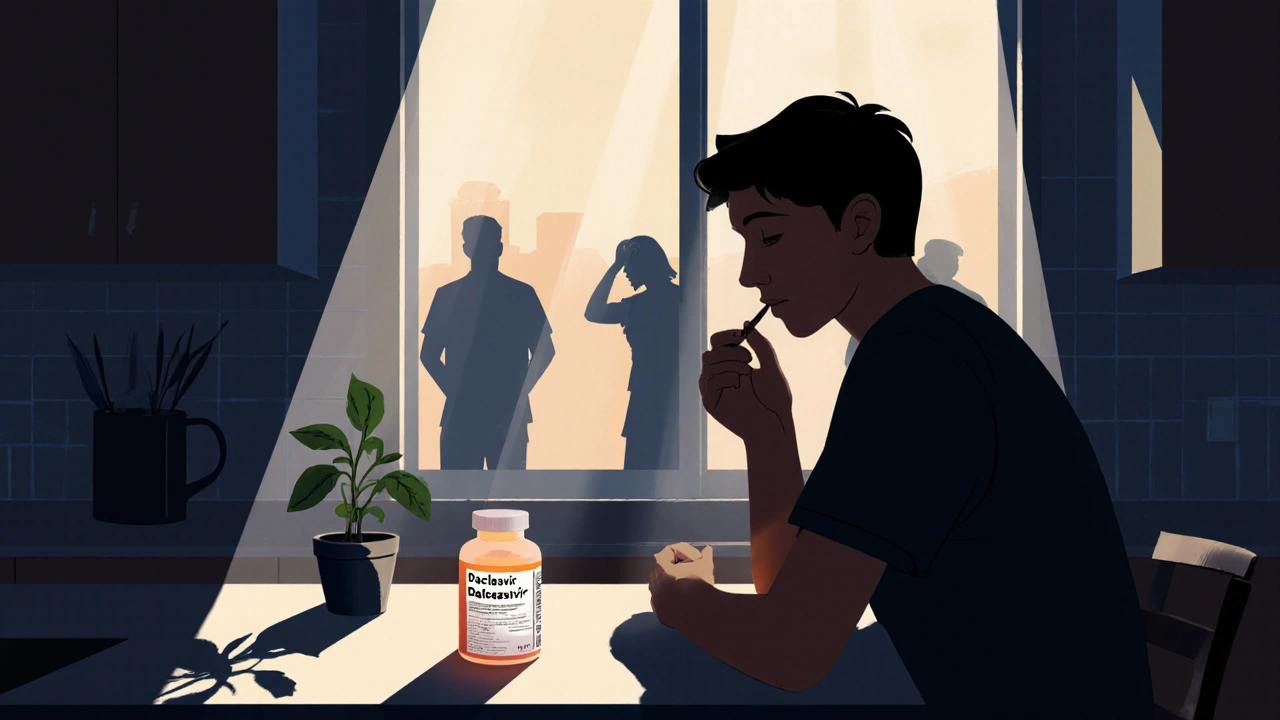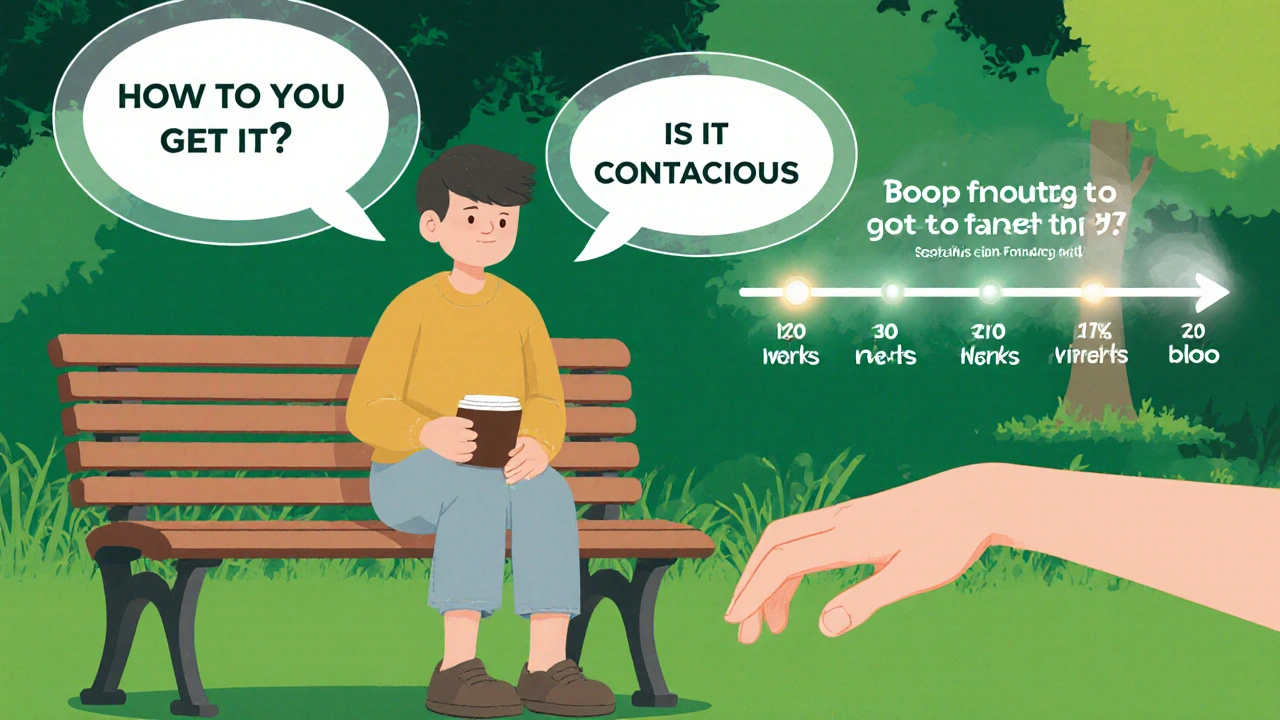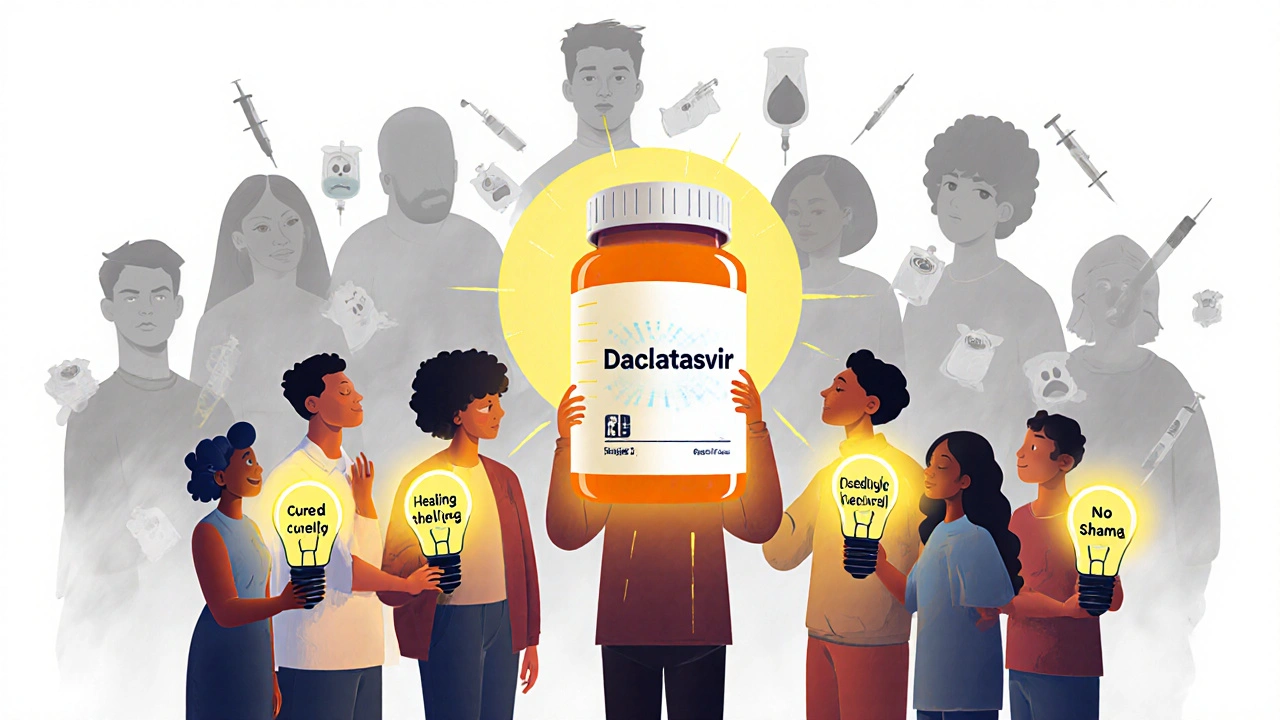Daclatasvir and Hepatitis C: How to Cope with Stigma While Taking Treatment
 Nov, 18 2025
Nov, 18 2025
When you’re prescribed daclatasvir for hepatitis C, the hardest part isn’t the pills-it’s the silence. The sideways glances. The way people pull back when you mention your diagnosis. You take your medicine every day, follow every doctor’s note, and still feel like you’re carrying something shameful. That stigma? It’s real. And it’s older than the virus itself.
Why Hepatitis C Still Carries Shame
Thirty years ago, hepatitis C was mostly linked to needle sharing or unsterile tattoos. That image stuck. Even though today, most cases come from old blood transfusions, unsafe medical procedures, or even accidental needle sticks in hospitals, people still assume you made a bad choice. They don’t know that one in 30 New Zealanders born between 1945 and 1965 has hepatitis C-and most never knew how they got it.
Daclatasvir doesn’t cure stigma. It cures the virus. But while your liver heals, your mind might still feel judged. You’re not alone. Studies show over 60% of people on hepatitis C treatment say they’ve hidden their diagnosis from friends or family. That’s not weakness. That’s survival.
How Daclatasvir Changes the Game
Daclatasvir isn’t just another pill. It’s part of a direct-acting antiviral (DAA) combo that clears hepatitis C in 95% of cases within 12 weeks. No interferon. No months of fatigue. No hospital visits. Just a daily tablet, usually with sofosbuvir, taken at home. Side effects? Mild-headache, tiredness, maybe nausea. Nothing like the old treatments that left people feeling like they were dying.
And here’s the truth no one tells you: once you start daclatasvir, you’re no longer contagious. After two weeks of treatment, the virus drops so low in your blood that you can’t pass it on. That means you can hug your kids, share a coffee with a friend, or kiss your partner without fear. The virus is leaving your body. But the fear? That lingers longer.
Breaking the Silence: Who to Tell-and How
You don’t owe anyone your medical history. But if you’re tired of pretending, here’s who might actually help:
- Your partner or close family: They’re already worried about you. Telling them gives them a chance to support you, not guess.
- A trusted friend: Pick one person who listens without reacting. Say: “I’ve been diagnosed with hepatitis C. I’m on treatment with daclatasvir. It’s curable now, but I’m still nervous about how people react.”
- Your doctor or counselor: They’ve heard this a hundred times. No judgment. Just help.
What NOT to say: “I’m sorry you have to hear this.” You didn’t do anything wrong. You’re not asking for pity. You’re sharing facts.

What to Say When People Ask
People will ask. Sometimes out of curiosity. Sometimes out of fear. Here’s how to respond without losing your calm:
- “How did you get it?” → “I don’t know exactly. It could’ve been decades ago. It doesn’t matter now-I’m being treated.”
- “Is it contagious?” → “Only through blood. Not through hugging, kissing, or sharing food. I’ve been on daclatasvir for three weeks-I’m no longer infectious.”
- “Will you get better?” → “Yes. 95% of people are cured. I’m one of them.”
Practice these lines. Say them out loud. You’re not defending yourself-you’re educating. And that’s powerful.
Where to Find Real Support (Not Just Advice)
Online forums can help-but real connection matters more. In Auckland, Hepatitis New Zealand runs free peer support groups every month. You’ll meet people who’ve been where you are. Some are cured. Some are still waiting for treatment. All of them know what silence feels like.
There’s also the Living with Hepatitis C app, developed by the University of Auckland. It tracks your meds, reminds you to take daclatasvir, and connects you to local support services. It doesn’t replace a therapist-but it gives you a quiet place to log how you feel without explaining it to anyone.
When Stigma Turns Into Depression
Stigma doesn’t just hurt your pride. It can crush your spirit. If you’re losing sleep, avoiding friends, or feeling worthless, you’re not being dramatic. You’re reacting to a heavy burden.
Studies show people with hepatitis C are three times more likely to develop depression than the general population. That’s not because of the virus. It’s because of how people treat you.
Ask your doctor for a referral to a counselor who understands chronic illness stigma. You don’t need a crisis to get help. You just need to say: “I’m struggling with how I’m being treated.” That’s enough.

What You Can Do Today
You don’t have to fix everything at once. Start small:
- Take your daclatasvir at the same time every day. Make it part of your routine-like brushing your teeth.
- Write down one thing you’re proud of this week. Maybe you cooked for yourself. Maybe you didn’t hide your pills. That counts.
- Reach out to one person. Even just a text: “I’ve been going through something tough. I’d appreciate you listening.”
- Turn off comments on social media if people are guessing about your health.
- Remember: you are not your diagnosis. You are someone who took control. That’s courage.
What Comes After Cure
After 12 weeks on daclatasvir, you’ll get a blood test. If the virus is gone, you’re cured. No more liver damage. No more risk of cirrhosis or liver cancer. That’s huge.
But some people still feel ashamed-even after they’re cured. That’s normal. Healing takes time. You might still flinch when someone mentions “liver disease.” You might still avoid medical forms that ask about your history.
That’s okay. You’ve already done the hardest part: you showed up. You took the pills. You didn’t give up. Now, give yourself permission to heal emotionally too.
You’re Not Broken. You’re Healing.
Daclatasvir doesn’t erase the past. But it gives you a future. And that future doesn’t have to be hidden. You don’t need to apologize for being sick. You don’t need to prove you’re “worthy” of care. You’re not a mistake. You’re a person who got sick, got treated, and got better.
There are thousands of people in New Zealand right now, taking daclatasvir in quiet kitchens, on lunch breaks, before bed. They’re not heroes. They’re just doing what they need to do. And so are you.
The virus is leaving your body. Let the shame leave too. You’ve earned that peace.
Can daclatasvir cure hepatitis C completely?
Yes. When taken with sofosbuvir, daclatasvir cures hepatitis C in 95% of cases after 12 weeks of treatment. It clears the virus from the bloodstream and stops liver damage. A follow-up blood test 12 weeks after finishing treatment confirms if the virus is gone.
Is daclatasvir safe for long-term use?
Daclatasvir is not meant for long-term use-it’s taken for 12 weeks only. Side effects are usually mild: headache, tiredness, or nausea. Serious reactions are rare. It doesn’t damage the liver or cause addiction. Once you finish the course, the drug leaves your system. There’s no need to keep taking it.
Can I pass hepatitis C to others while on daclatasvir?
After two weeks of taking daclatasvir, the amount of virus in your blood drops so low that you can’t transmit it. You can safely hug, kiss, share meals, or have sex without risk. The virus is only spread through blood-to-blood contact-like sharing needles or unsterile medical tools.
Will my insurance cover daclatasvir in New Zealand?
Yes. In New Zealand, daclatasvir and other direct-acting antivirals are fully funded by the government for all residents with hepatitis C. You won’t pay for the medication, even if you’re on a work visa or have a temporary permit. You do need a prescription from a specialist or GP trained in liver disease.
How do I know if I have hepatitis C?
Most people don’t feel sick for decades. The only way to know is through a blood test. If you were born between 1945 and 1965, had a blood transfusion before 1992, used injectable drugs, or had a tattoo in an unlicensed shop, you should get tested. Testing is free and confidential in New Zealand clinics.
Can I drink alcohol while taking daclatasvir?
It’s best to avoid alcohol completely while on treatment. Even small amounts can stress your liver and reduce how well daclatasvir works. After you’re cured, moderate drinking might be okay-but only if your liver is healthy. Your doctor can help you decide what’s safe for you.

Richard Risemberg
November 19, 2025 AT 11:12Let me tell you something-I’ve been on daclatasvir for 10 weeks now. I told my mom last week. She cried. Not because she thought I was dying, but because she realized how long I’d been carrying this weight alone. I used to hide my pills in a toothpaste tube. Now I leave them on the counter like coffee mugs. It’s not about being brave-it’s about refusing to let shame rewrite my story. You’re not broken. You’re just overdue for some damn peace.
And if anyone says ‘how’d you get it?’-just smile and say, ‘Does it matter? I’m fixing it.’ That shuts down the whole damn circus.
Also-thank you for mentioning the app. Downloaded it. Got a notification right now. ‘Take your pill, champ.’ I’m gonna hug my phone later.
Sam Reicks
November 20, 2025 AT 01:29Chuck Coffer
November 21, 2025 AT 12:53Marjorie Antoniou
November 22, 2025 AT 08:44Chuck, your comment is exactly why this post matters. You’re not wrong to be cautious-but you’re wrong to assume guilt. Most people with Hep C didn’t choose this. And even if they did, does it make them less human? Less deserving of care?
I worked in a clinic for 12 years. I’ve seen a teacher get it from a needlestick. A veteran from a battlefield transfusion. A grandmother from a tattoo in 1978. None of them deserved to be treated like pariahs. Stigma doesn’t protect public health-it just makes people hide. And hiding means they don’t get treated. And untreated means they spread it. So yes, we need to talk. But we need to talk with kindness, not judgment.
Andrew Baggley
November 22, 2025 AT 22:49Just finished my 12-week course yesterday. Blood test next week. I’m not celebrating yet-but I’m sleeping through the night for the first time in three years. I used to check my liver enzymes like a stock ticker. Now I’m learning to breathe again. Daclatasvir didn’t just kill the virus-it gave me back my quiet mornings. My coffee without guilt. My hugs without fear. You don’t need to tell everyone. But if you’re tired of pretending, start with one person. One. That’s all it takes to crack the silence. And once it cracks? Light floods in.
You’re not alone. I’m right here with you.
Frank Dahlmeyer
November 24, 2025 AT 07:47Look, I’ve spent the last decade reading every study, every journal, every patient forum on DAAs. And let me tell you-daclatasvir is the most transformative medical intervention I’ve seen in my lifetime. We’re talking about a drug that turns a death sentence into a footnote. No more interferon-induced psychosis. No more hospitalizations. No more decades of waiting for cirrhosis to creep in. This isn’t just medicine-it’s a societal reset. And yet, the stigma persists because we’re still living in the 1980s mindset where illness equals moral failure. We vaccinate against hepatitis B, we treat HIV with dignity, but Hep C? Still whispered about like it’s a dirty secret. It’s not. It’s a virus. And viruses don’t judge. People do. And people need to grow up. The cure is here. The shame? That’s optional. You don’t have to carry it. You never did.
Codie Wagers
November 24, 2025 AT 17:26Paige Lund
November 25, 2025 AT 23:02Reema Al-Zaheri
November 27, 2025 AT 06:55